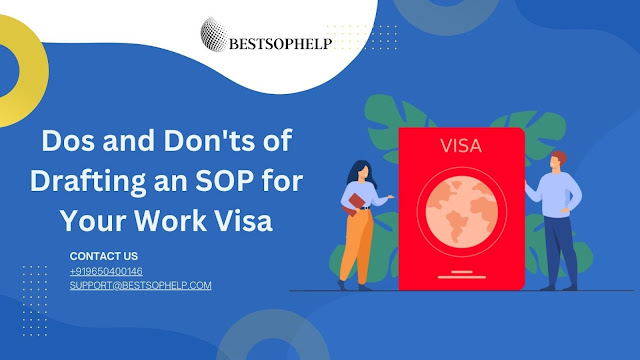Common Mistakes in SOPs That Can Lead to Visa Rejections
One of the crucial components of any visa application process, especially for higher education or job opportunities abroad, is the Statement of Purpose (SOP). An SOP is a document that outlines an applicant's academic achievements, career goals, and reasons for wanting to study or work in a particular country. However, there are common mistakes that applicants often make in their SOP after visa refusal, which can lead to visa rejections. In this blog, we will discuss these mistakes and provide tips on how to avoid them to increase your chances of a successful visa application.
Lack of Clarity and Purpose
One of the most prevalent mistakes in SOPs is a lack of clarity and purpose. An SOP should clearly state the applicant's objectives, reasons for choosing a specific course or job, and how it aligns with their career goals. Vague or ambiguous statements can confuse visa officers, making it harder for them to understand your intentions. To avoid this, be specific about your goals, and explain how your chosen path will contribute to your overall career aspirations.
Using Generic Templates
Using generic SOP templates that can be easily found online is a grave mistake. Visa officers read numerous applications, and they can easily spot a generic SOP. Such documents do not reflect the applicant's unique qualities, experiences, and aspirations. It's crucial to personalize your SOP to showcase your individuality, emphasizing what makes you a standout candidate.
Ignoring the Guidelines
Each country and institution often has specific guidelines for writing SOPs. These may include word limits, format preferences, and even specific questions to be addressed. Failing to adhere to these guidelines signals a lack of attention to detail, which can be detrimental to your application. Always read and follow the provided instructions carefully.
Exaggerating Achievements
While it's important to highlight your accomplishments, exaggerating or fabricating them can lead to serious consequences. Visa officers are skilled at detecting inconsistencies in your application. Provide accurate and verifiable information about your academic achievements, work experience, and extracurricular activities.
Neglecting to Explain Gaps in Education or Work Experience
Gaps in education or employment history are common and can happen for various reasons. However, failing to address these gaps in your SOP can raise suspicion. Be honest about any breaks in your academic or professional journey and use the opportunity to explain how you utilized that time for personal growth, skill development, or other constructive activities.
Poor Language and Grammar
A poorly written SOP can create a negative impression. Grammatical errors, awkward sentence structures, and spelling mistakes reflect negatively on your communication skills. Always proofread your SOP and consider seeking feedback from others to ensure it is well-written and free of errors.
Focusing Solely on Academics
While academic achievements are important, an SOP should not read like a transcript. It's essential to showcase your holistic personality, including your interests, hobbies, volunteer work, and extracurricular activities. This provides a well-rounded view of who you are and how you'll contribute to the academic or professional community.
Overusing Clichés and Jargon
Avoid using clichés and industry-specific jargon excessively. While it's important to demonstrate your knowledge and passion for your field, too much technical language can alienate non-experts, including visa officers who may not have a deep understanding of your field.
Failing to Address Future Plans
Your SOP should not only focus on your past achievements but also articulate your future plans. Explain how the course or job opportunity aligns with your long-term career goals. This demonstrates that you have carefully considered the impact of your choices and have a clear vision for your future.
Conclusion
Writing a compelling SOP is a crucial step in the visa application process. Avoiding these common mistakes can significantly increase your chances of a successful application. Remember to be genuine, specific, and attentive to detail. Seek feedback from trusted advisors or mentors to ensure your SOP reflects your true potential and aspirations. With a well-crafted SOP, you'll be one step closer to realizing your academic or professional dreams abroad.
For More Information Visit Our Website: Best SOP Help
Contact Us: +919650400146


.jpg)
This comment has been removed by the author.
ReplyDeleteGreat blog! I really enjoyed reading your informative posts. For students studying law, I highly recommend using Constitutional Law Assignment Help with BookMyEssay — truly reliable and professional service!
ReplyDelete